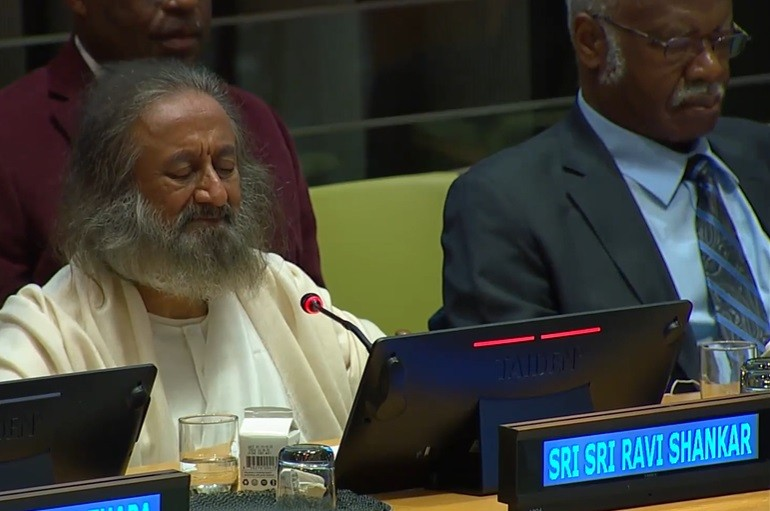
United Nations: Amid ongoing global conflicts, an atmosphere of calm enveloped the UN headquarters as Sri Sri Ravi Shankar led a meditation session aimed at fostering peace. This took place on Friday, coinciding with intense discussions in the Security Council about various threats to international peace, including issues related to children in armed conflicts, tensions in the Middle East and Africa, and the Ukraine War.
In the serene setting of the Trusteeship Council Chamber, Ravi Shankar conducted the ‘Meditation for Global Peace and Harmony’ in honor of the newly established World Meditation Day, recognized by the General Assembly earlier this month. He emphasized the importance of meditation in cultivating inner peace and security, suggesting that it could significantly improve the state of the world.
Ravi Shankar urged nations to focus more on peace education, advocating for teaching young people how to relax, manage negative emotions, and find balance in their lives. He is the founder of the Art of Living Foundation.
On December 6, the General Assembly unanimously adopted a resolution, proposed by a coalition including India, Liechtenstein, Sri Lanka, Nepal, Mexico, and Andorra, to designate the Winter Solstice as World Meditation Day. This day complements the International Day of Yoga, celebrated on the Summer Solstice, also initiated by India.
General Assembly President Philemon Yang remarked that meditation knows no boundaries, faiths, or traditions, providing everyone with a chance to pause and connect with their inner selves. He noted that in its silence, meditation conveys a universal truth about our shared humanity and desire for understanding.
Under-Secretary-General Atul Khare highlighted the importance of mental health for UN peacekeepers, who face severe challenges. He mentioned the introduction of a multilingual app that includes meditation resources to support their well-being.
India’s Permanent Representative P. Harish spoke about ‘Dhyana’, or meditation, which has roots in ancient Indian traditions and is essential for achieving inner calm and harmony between the mind and body. He noted that the winter solstice marks the beginning of ‘uttarayana’, a time for introspection in Indian culture, and emphasized India’s commitment to global well-being, guided by the principle of Vasudaiva Kutumbakam, or the belief that the world is one family.
